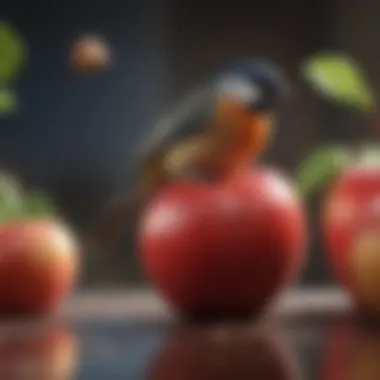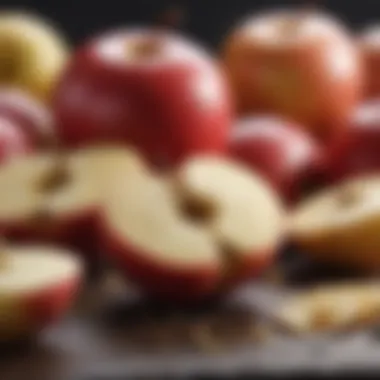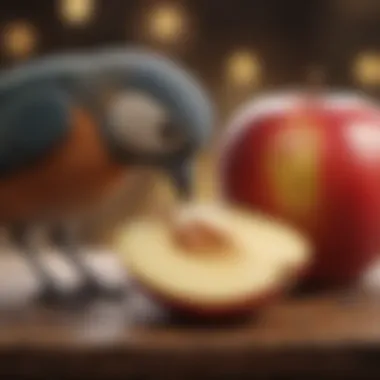Can Pet Birds Eat Apples? A Comprehensive Guide


Intro
Apples are a fruits many people enjoy, and the curriousity exists whether these crisp and juicy delights are suitable for our avian companions. Understanding the importance of nutrition in a pet bird's diet is fundamental to their health. While offering a varie of fruits can be beneficial, not all fruits are created equal. This article delves into the specifics of apple consumption, providing essential insights into their benefits in bird diets, potential risks, and safe practices for introduction.
Care Tips
When integrating apples into your pet bird's diet, it’s important to approach their care holistically. This involves establishing daily care routines, creating a conducive cage environment, and maintaining good hygiene practices.
Daily Care Routines
Birds thrive on consistent care schedules. Incorporating specific feeding times where apples can be included, allows birds to adapt to new foods better. Monitor their reaction to apples on the great cotntrol if they enjoy them.
Cage Setup and Maintenance
Proper cage setup is essential. Ensure cages are spacious enough to allow movement for nibbling on fresh fruit and inspecting food thoroughly. Consider naturally safe materials when constructing their environment.
Hygiene and Cleaning Practices
Regular cleaning is vital for the bird’s health. It is recommended to wash any apples before offering them to remove pesticide residues or other contaminants. Clean their bedding and feeding station to elminate unnatural buildup solutions for fungal and bacterial problems.
Seasonal Care Adjustments
Understand that seasonal changes influence a bird's dietary needs. While apples can be fed year-round, ensure that your bird's diet reflects seasonal availability of fresh produce. Apparently, this ensures nutrition throughout different climates.
Nutritional Value of Apples for Birds
Apples carry several health benefits for pet birds but also some risks. For instance, apples are a source of essential vitamins like Vitamin C and A. These vitamins can boost a bird’s immunity and promote better health outcomes.
Safe and Toxic Foods
Before introducing any new foods, especially fruits like apples, it's importnat to know which parts are safely consumable. While the pulp of apples is generally safe, the seeds contain cyanogenic compounds. Remove all seeds before serving.
Wellness and Health
A bird's well-being critically hinges on their diet. Diseases can stem from improper feeding regimes. Monitor their overall health by observing their behavior and wind movement post feedng.
Epilogue
Understanding how to incorporate apples in a pet bird’s diet is essential. Ensure that you choose fresh, organic options to reduce exposure to pesticides. With this guide, pet owners can enhance their feathered friends' diets securely.
"Healthy parrots tend to be more energetic, vocal, and engage in play."
Following the right approach empowers both owners and birds enjoy the fruit together safely.
Foreword to Avian Nutrition


Birds require a specific nutritional profile to thrive, and a proper understanding of avian nutrition is critical for pet owners. This knowledge provides the foundation for selecting suitable foods and ensuring that birds receive all essential nutrients. The significance of increasing awareness on dietary needs cannot be understated, as poor nutrition can lead to serious health issues, including obesity, feather problemms, and, in extreme cases, premature death.
Understanding Your Bird's Dietary Needs
Avian nutrition may seem straightforward, but each species of bird has its own unique needs. For instance, some species thrive on seeds while others, like many parrots, require a broader range of nutrients, including pellets, vegetables, and fruits. Understanding these dietary requirements can help pet owners select quality bird food tailored to their birds' specific needs. Additionally, factors such as age, size, and activity level should be considered when determining an appropriate diet. Every single bird is unique, and their individual requirements will partially be dependent on their specific ihealth concerns—discerning these needs helps ensure appropriate dietary choices.
The Role of Fruits in a Bird's Diet
Fruits serve as a delightful addition to a bird's diet, providing both nourishment and variety. While seeds and pellets are often primary food sources, incorporating fruit can offer essential vitamins and minerals. For example, fruits like apples are rich in vitamin C and dietary fiber. These nutrients support immune function, digestion, and overall health. It's important, however, to exercise caution and balance when offering fruits, as too much natural sugar can upset a bird's diet. Properly selected fruits can enchant your feathered companion, making meal times more engaging and enjoyable.
Key Note: While fruits are beneficial, moderation is essential to a balanced diet.
Nutritional Profile of Apples
Understanding the nutritional profile of apples is essential for any bird owner considering incorporating this fruit into their pet's diet. Apples, a popular choice among many, provide a unique blend of vitamins, minerals, and antioxidants. These nutrients can support overall health and vitality in pet birds, making apples a viable addition to their meals.
Vitamins and Minerals Found in Apples
Apples are particularly rich in various vitamins and minerals. Notably, they contain Vitamin C, which is crucial for the immune system and helps in maintaining healthy skin and feathers in birds. While pet birds may receive enough Vitamin C through standard avian pellets or other fresh fruits, apples can give them an extra boost.
In addition to Vitamin C, apples provide dietary fiber, promoting healthy digestion. The minerals found in apples, such as potassium and calcium, play important roles in maintaining nerve function and bone health. Perhaps less well-known is the presence of beneficial antioxidants, like quercetin, which may help reduce cellular damage.
Overall, apples contain nutrients that contribute directly to avian well-being and provide a varied diet.
Health Benefits Associated with Apple Consumption
Introducing apples into your bird's meal can yield significant health benefits. The high water content in apples not only hydrates but also promotes freshness in the diet. When consumed in moderation, apples can help in weight management, as they are lower in calories compared to processed snacks birds might otherwise prefer.
A few of the health benefits associated with apple consumption include:
- Support for digestion: The fiber aids in proper bowel function.
- Boosting the immune system: Vitamins will enhance resistance to illnesses.
- Dental health benefits: Chewing apples helps in maintaining healthy beaks and preventing plaque buildup.
In closing, offering apples as a treat can contribute positively to your pet bird's health, provided you are aware of best practices.
Including apples in a bird's diet goes beyond sustenance—it enhances their overall culinary experience while offering various health benefits.
Are Apples Safe for Pet Birds?
The safety of feeding apples to pet birds is crucial to understand. While apples can offer nutrition, there are potential hazards involved in including them in your bird's diet. Knowing what these risks are aids bird owners in ensuring the health and well-being of their feathered companions.
Potential Risks of Feeding Apples to Birds:
Feeding apples to birds must be done with caution. There are some pertinent risks to consider:
- Pesticide Exposure: Many apples are coated with pesticides, which can be harmful when ingested by birds. Birds have different metabolism pathways compared to humans, making them more sensitive to these chemicals. Even a small amount can lead to health issues over time.
- Seed Toxicity: The seeds of apples contain cyanogenic compounds, which can be toxic. Although birds would need to consume a significant quantity for it to be lethal, it is best to avoid giving them the seeds altogether.
- Digestive Issues: Too much fruit in a bird's diet can lead to stomach problems, including diarrhea. Apples should not replace staple foods.
- Sugar Excess: Apples contain natural sugars. Feeding them in large quantities can lead to obesity and other metabolic Issues for birds, particularly species that are prone to weight gain.


Understanding Pesticides and Apple Carbohydrates:
It is critical to address the role of pesticides and carbohydrates before adding apples to a bird's menu. Pesticides can remain on the skin even after washing. Buying organic apples or thoroughly rinsing the conventional ones before peeling is advisable. The process of steaming or cooking also helps to reduce pesticide levels but might change the thwo.
Moreover, apples have varying sugar content based on type and ripeness. For birds needing a restricted carbohydrate diet, monitoring sugar levels becomes significant.
Taking these factors into account will create a well-balanced approach to including apples in your bird's diet, ensuring they derive benefits without compromising their health.
Best Practices for Feeding Apples to Birds
Feeding apples to birds can be rewarding, but understanding best practices is crucial. Birds, like all pets, benefit from an optimal diet, and introducing new foods requires careful consideration. It aids in providing nutrients while ensuring safety. Therefore, one must be diligent when choosing and preparing apples for birds. Below are essential aspects to keep in mind regarding the appeal and benefits of good feeding practices.
Selecting the Right Type of Apple
Not all apples are created equal. Priority should be given to selecting organic apples whenever possible. Commercially grown apples may contain pesticides, which can be harmful to birds. Varieties such as Fuji, Gala, and Honeycrisp are often favorites due to their sweet flavor and crisp texture. Avoid apples with visible blemishes or mold. The peel of the apple holds many beneficial nutrients, but care should be taken to remove any unwanted residues. It is important that pet owners research which varieties their specific birds prefer.
Preparing Apples for Your Birds
Apples should be prepared thoughtfully before serving. Start by washing them thoroughly under running water; this removes dirt and any pesticides present. After washing, slice the apple into manageable pieces suitable for your bird. Some birds may prefer smaller cubes, while others might grasp larger slices better. Removing the seeds is critical, as apple seeds contain cyanogenic compounds, which can be toxic to birds. You want to ensure that preparation not only enhances appeal but also maintains safety.
Portion Sizes and Frequency of Feeding
When it comes to portion sizes, moderation is key. A few small pieces a few times a week can be ideal. For larger birds, one-third of an apple may be provided as a treat. Smaller birds typically need less, perhaps a piece the size of a cherry. Offer apples as part of a balanced diet that includes other foods such as seeds, pellets, and vegetables. Frequent but small servings help avoid stomach upsets and keep your birds interested in their diets.
The importance of diet diversity cannot be emphasis enough. The more variance in fruits and vegetables provided, the healthier and more content your birds will be.
Ensuring the right practices for feeding apples contributes to a healthier, happier avian companion. Follow these essential guidelines to make your introduction of apples both safe and enjoyable for your pet.
Species-Specific Considerations
Understanding how different species of pet birds react to apple consumption is critical for any bird owner. These creatures vary not only in size but also in their individual dietary and nutritional needs. Always consider the specific species when introducing new food, as some may digest apples better than others. Proper feeding practices ensure the health and happiness of your avian companions.
Feeding Apples to Budgerigars
Budgerigars, commonly known as budgies, are small parakeets known for their bright colors and friendly demeanor. These birds can safely enjoy apples as part of a balanced diet, provided that owners pay attention to what's most beneficial.
- Preparation: Cut apples into tiny, manageable pieces to address the small beaks of budgerigars. Pips should be removed as they can be a choking hazard.
- Benefits: Apples provide essential vitamins like Vitamin C, which can support your budgie’s immune system. However, moderation is key. Only a few small pieces are necessary.
- Frequency: It is advisable to limit apple serving to a couple of times a week to prevent digestive issues. Maintaining a varied diet remains crucial.
Feeding Apples to Cockatiels
Cockatiels are a bit larger than budgies and are known for their playful nature. Feeding your cockatiel apples has its own set of recommendations that can enhance its welfare.
- Trim Size: Slice apples into larger wedges for cockatiels to nibble. Ensure the core is removed carefully.
- Nutritional Gain: The intake of apples helps to diversify their diet. Cockatiels particularly benefit from apples due to their fiber content, which assists in digestive health.
- Parental Guidance: Monitor vase feeding. It is ideal to introduce apples along with other fruits and vegetables to enforce balanced nutrients intake.
Feeding Apples to African Grey Parrots
African Grey Parrots are intelligent and social birds and can enjoy the refreshing taste of apples as well. These birds present different dietary considerations given their unique digestive traits.


- Slice Criteria: Apples should be sliced thinly. African Greys often prefer more elaborate chewable textures, enhancing ingestion.
- Importance of Balance: Apples should complement a wider variety of fresh foods, seeds, and pellets. Their nutritional profile can aid cognitive development, but it should not be the bulk of their diet.
- Observational Care: Being alert to allergic reactions after introducing apples will guarantee your Parrot's safety and well-being. Not every bird reacts the same way to this fruit.
When introducing any new food, including apples, consider applying the 'three-day rule': introduce the item slowly while observing for any signs of adverse effects.
By appreciating these species-specific guidelines, pet bird owners can strategically enrich their birds’ diets and contributes significantly to their overall health.
Monitoring Your Bird’s Health
Monitoring the health of your pet bird is of utmost importance, especially when it comes to their diet. Birds can harbor food intolerances and allergies similar to those found in mammals. Apples, while nutritious, can trigger adverse reactions in some species or individual pets. Keeping a close watch on your bird’s reaction to apples introduces valuable information to ensure their well-being. Health is not just about what they eat; it also encapsulates how they react to their food. Thus, integrating apples into their diet requires careful observation.
Good health also entails regular monitoring of your bird to detect signs of distress or discomfort promptly. This remains critical after adding new foods, like apples. Awareness spells the difference between normal behavior and symptoms of allergies. Synchronizing a balanced diet with vigilant health monitoring fosters a happier and healthier avian companion.
Signs of Allergic Reactions or Intolerance
Identifying adverse reactions like allergies is essential. Birds exhibit symptoms when they encounter intolerable substances within a food like apples. Common signs to watch for include:
- Changes in appetite: Sudden loss of interest in food after apple introduction.
- Behavioral shifts: Increased agitation or lethargy may indicate discomfort.
- Digestive issues: Diarrhea or changes in droppings could signal an intolerance.
- Skin irritations: Feather picking or redness around the beak can also emerge.
If you observe any of these symptoms, it may indicate that your bird is experiencing an intolerance or allergy. In such instances, it’s prudent to remove the apples completely from their diet and monitor their condition closely.
Observing symptoms early can provide Quick indications that your pet needs help.
When to Consult with an Avian Veterinarian
If concerns arise about your bird's health, consultations should not be disregarded. It becomes especially vital when the signs suggest an allergic reaction. Reach out to an avian veterinarian under these circumstances:
- The symptoms do not resolve within a short period after you stop feeding apples.
- Your bird displays noticeable pain or behavior that seems outside their typical nature.
- Positive determination of health issues linked to diet that could expand beyond apples.
Your avian vet brings not just expertise but also a wealth of resources for diagnostic testing. They can provide thorough insights into a comprehensive approach to ensure the lasting health of your pet bird.
Maintaining regular health checks with your vet, even beyond incidents, assures that your bird remains healthy and any underlying issues are caught early.
Concluding Thoughts
Understanding the dietary needs of pet birds is essential for their overall health and well-being. In this article, we explore several facets of apple consumption, offering a comprehensive outlook on nutritional value, safety concerns, and appropriate practices for introducing this fruit into a bird's diet. Each section unveils specific details that contribute to fostering informed choices among bird owners. The concluding part synthesizes the insights gathered while emphasizing the main takeaways.
The Importance of Variety in Avian Diets
Offering variety in a bird's diet nurtures not just physical health, but mental stimulation as well. Complementing staple foods like seeds and pellets with fruits such as apples enriches protein, fat, and vitamin intake. Apples are but one element of a well-balanced diet, enhancing texture and flavor while encouraging birds to explore different tastes.
Additionally, consuming various foods prevents nutritional deficiencies. Many birds can become fussy eaters, leading to unbalanced diets when left with few options. By providing a slew of food including vegetables, grains, and fruits, owners foster an engaging environment to attract natural behaviors like foraging. Apples also offer a natural source of hydration, an underrated aspect of avian care.
In summation, a diverse diet not only supports physical health but also enhances quality of life. A lack in variety may result in long-term consequences for birds of all species.
Final Recommendations for Bird Owners
When considering the inclusion of apples in your bird's diet, be mindful of certain factors:
- Select organic apples when possible to minimize pesticide exposure.
- Always remove any seeds and core, which can pose risks to their health.
- Provide apples as a treat, limiting portions to avoid dietary imbalances.
- Monitor your bird's reactions during initial feedings to rule out allergies or preferences.
- Balance apple consumption with other fruits and vegetables for optimal nutrition.
By following these mentoring principles, bird owners ensure a safe and enjoyable eating experience for their feathered companions. Education and attentiveness are vital in creating a favorable dietary atmosphere. Understanding each facet of fruit feeding can help minimize risks and ultimately lead to a happier and healthier pet bird.















